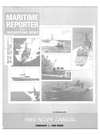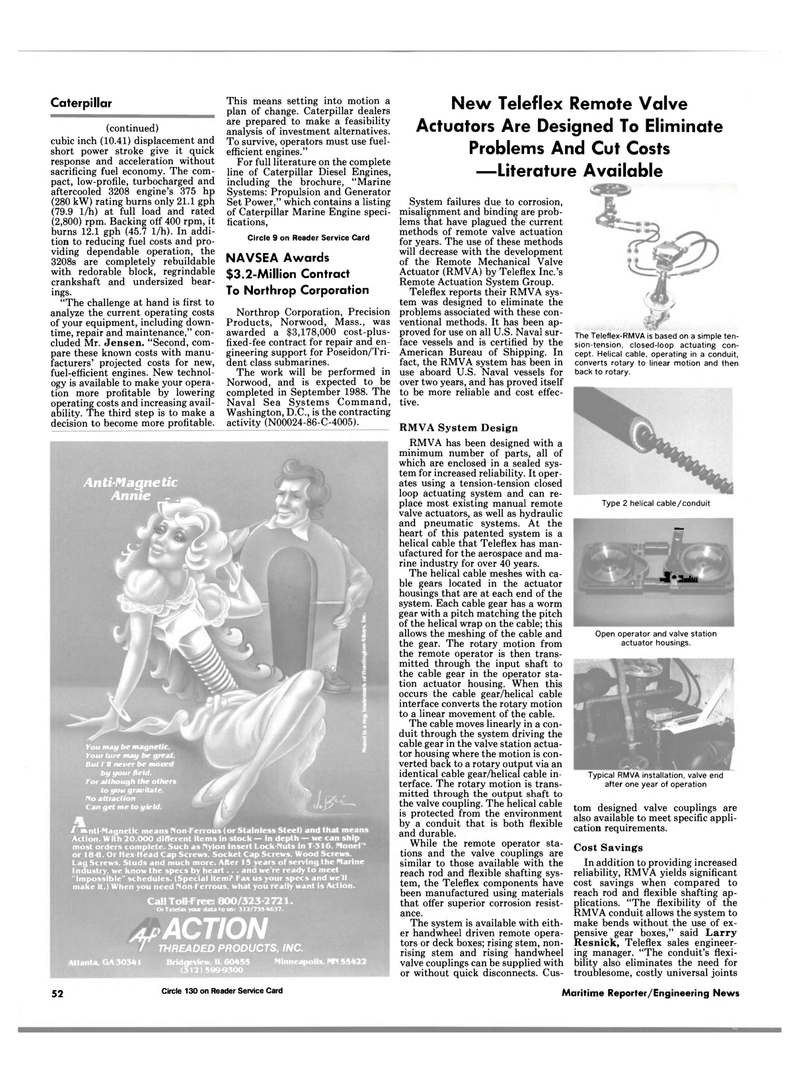
Page 50: of Maritime Reporter Magazine (February 1986)
Read this page in Pdf, Flash or Html5 edition of February 1986 Maritime Reporter Magazine
Caterpillar (continued) cubic inch (10.41) displacement and short power stroke give it quick response and acceleration without sacrificing fuel economy. The com- pact, low-profile, turbocharged and aftercooled 3208 engine's 375 hp (280 kW) rating burns only 21.1 gph (79.9 1/h) at full load and rated (2,800) rpm. Backing off 400 rpm, it burns 12.1 gph (45.7 1/h). In addi- tion to reducing fuel costs and pro- viding dependable operation, the 3208s are completely rebuildable with redorable block, regrindable crankshaft and undersized bear- ings. "The challenge at hand is first to analyze the current operating costs of your equipment, including down- time, repair and maintenance," con- cluded Mr. Jensen. "Second, com- pare these known costs with manu- facturers' projected costs for new, fuel-efficient engines. New technol- ogy is available to make your opera- tion more profitable by lowering operating costs and increasing avail- ability. The third step is to make a decision to become more profitable.
This means setting into motion a plan of change. Caterpillar dealers are prepared to make a feasibility analysis of investment alternatives.
To survive, operators must use fuel- efficient engines."
For full literature on the complete line of Caterpillar Diesel Engines, including the brochure, "Marine
Systems: Propulsion and Generator
Set Power," which contains a listing of Caterpillar Marine Engine speci- fications,
Circle 9 on Reader Service Card
NAVSEA Awards $3.2-Million Contract
To Northrop Corporation
Northrop Corporation, Precision
Products, Norwood, Mass., was awarded a $3,178,000 cost-plus- fixed-fee contract for repair and en- gineering support for Poseidon/Tri- dent class submarines.
The work will be performed in
Norwood, and is expected to be completed in September 1988. The
Naval Sea Systems Command,
Washington, D.C., is the contracting activity (N00024-86-C-4005).
New Teleflex Remote Valve
Actuators Are Designed To Eliminate
Problems And Cut Costs —Literature Available
System failures due to corrosion, misalignment and binding are prob- lems that have plagued the current methods of remote valve actuation for years. The use of these methods will decrease with the development of the Remote Mechanical Valve
Actuator (RMVA) by Teleflex Inc.'s
Remote Actuation System Group.
Teleflex reports their RMVA sys- tem was designed to eliminate the problems associated with these con- ventional methods. It has been ap- proved for use on all U.S. Naval sur- face vessels and is certified by the
American Bureau of Shipping. In fact, the RMVA system has been in use aboard U.S. Naval vessels for over two years, and has proved itself to be more reliable and cost effec- tive.
RMVA System Design
RMVA has been designed with a minimum number of parts, all of which are enclosed in a sealed sys- tem for increased reliability. It oper- ates using a tension-tension closed loop actuating system and can re- place most existing manual remote valve actuators, as well as hydraulic and pneumatic systems. At the heart of this patented system is a helical cable that Teleflex has man- ufactured for the aerospace and ma- rine industry for over 40 years.
The helical cable meshes with ca- ble gears located in the actuator housings that are at each end of the system. Each cable gear has a worm gear with a pitch matching the pitch of the helical wrap on the cable; this allows the meshing of the cable and the gear. The rotary motion from the remote operator is then trans- mitted through the input shaft to the cable gear in the operator sta- tion actuator housing. When this occurs the cable gear/helical cable interface converts the rotary motion to a linear movement of the cable.
The cable moves linearly in a con- duit through the system driving the cable gear in the valve station actua- tor housing where the motion is con- verted back to a rotary output via an identical cable gear/helical cable in- terface. The rotary motion is trans- mitted through the output shaft to the valve coupling. The helical cable is protected from the environment by a conduit that is both flexible and durable.
While the remote operator sta- tions and the valve couplings are similar to those available with the reach rod and flexible shafting sys- tem, the Teleflex components have been manufactured using materials that offer superior corrosion resist- ance.
The system is available with eith- er handwheel driven remote opera- tors or deck boxes; rising stem, non- rising stem and rising handwheel valve couplings can be supplied with or without quick disconnects. Cus-
The Teleflex-RMVA is based on a simple ten- sion-tension, closed-loop actuating con- cept. Helical cable, operating in a conduit, converts rotary to linear motion and then back to rotary.
Type 2 helical cable/conduit a. •J * aSln.
Open operator and valve station actuator housings.
Typical RMVA installation, valve end after one year of operation torn designed valve couplings are also available to meet specific appli- cation requirements.
Cost Savings
In addition to providing increased reliability, RMVA yields significant cost savings when compared to reach rod and flexible shafting ap- plications. "The flexibility of the
RMVA conduit allows the system to make bends without the use of ex- pensive gear boxes," said Larry
Resnick, Teleflex sales engineer- ing manager. "The conduit's flexi- bility also eliminates the need for troublesome, costly universal joints
Call Ton-Free: 800/323-2721.
Or Telefax your data to us: 312/7354637. y,
ACTION
THREADED PRODUCTS, INC.
Atlanta. GA 30341 Bridgeview. IL 60455 (312)599-9300
Minneapolis, POT 55422
Anti-Magne tic
Annie - „
You may be magnetic.
Your lure may be great.
But I'll never be moved by your field.
For although the others to you gravitate, no attraction
Can get me to yield. /mnti-Magnetic means Non-Ferrous (or Stainless Steel) and that means
Action. With 20.000 different items in stock — in depth — we can ship most orders complete. Such as Nylon Insert Lock-Nuts in T-316. Monel'" or 18-8. Or Hex-Head Cap Screws. Socket Cap Screws. Wood Screws.
Lag Screws. Studs and much more. After 15 years of serving the Marine
Industry, we know the specs by heart.. . and we're ready to meet "impossible" schedules. (Special item? Fax us your specs and we'll make it.) When you need Non-Ferrous. what you really want is Action. 52 Circle 130 on Reader Service Card Maritime Reporter/Engineering News

 49
49

 51
51
